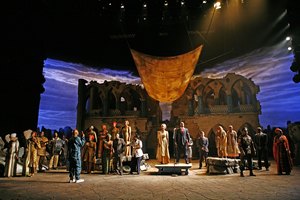SITE GUIDE
SEARCH
REVIEWS
REVIEW ARCHIVES
ADVERTISING AT CURTAINUP
FEATURES
NEWS
Etcetera and
Short Term Listings
LISTINGS
Broadway
Off-Broadway
NYC Restaurants
BOOKS and CDs
OTHER PLACES
Berkshires
London
California
New Jersey
DC
Connecticut
Philadelphia
Elsewhere
QUOTES
TKTS
PLAYWRIGHTS' ALBUMS
LETTERS TO EDITOR
FILM
LINKS
MISCELLANEOUS
Free Updates
Masthead
Writing for Us
A CurtainUp  London Review
London Review
 London Review
London ReviewWelcome to Thebes
by Cassie Robinson
|
He put this gun into my hand and made me human once again. . . I am all power. I am revenge. — Megaera
|

Cast in Welcome to Thebes (Photo: Nobby Clark) |
Welcome to Thebes takes as its main character Eurydice, not of Orpheus fame, but someone who is no more than a cameo figure in the ancient Theban tragedies. Creon's wife, she loses both her sons to the sweep of wider history: one to civil war and one to her husband's intransigent handling of the Antigone affair. Here, she is here "the elected leader of Thebes" and so a compassionate, sensible, although not perfect, woman replaces her autocratic husband. The play is set in the immediate wake of the battle between the two rivals to power, Oedipus' sons Eteocles and Polyneices. In a state reeling from atrocities inflicted by fellow citizens, there is mass killing and rape, while children wield weapons and rumours of cannibalism abound. The challenge facing Eurydice is how to heal a country ravaged both psychologically and physically.
Nikki Amuka-Bird tackles the part of Eurydice with stature and sincerity: a woman who has lost both son and husband to the war but within this grief and bereavement, must represent new curative hope for her country. David Harewood puts in an excellent performance as Theseus: the quasi-American politician sent to the war-torn state with the promise of both monetary relief and condescending ideals of democracy. Harewood is wonderful as this strutting, proud "first citizen of Athens" who in spite of his ego and folly is swooningly charismatic.
In addition, there is an overwhelming panorama of characters, including a battered, scruffy-looking Antigone (Vinette Robinson), her better-adjusted sister Ismene (Tracy Ifeachor) and the prophet Tiresias (Bruce Myers) the cryptic, infallible seer turned cross-dressing figure of camp comedy. Chuk Iwuji is the deliciously swaggering but brutal Tydeus, a warlord of flashy magnetism and sheer cruelty. There is a veritable chorus of female senators, elected to power by a Lysistrata-style manipulation of Theban husbands, and some rifle-touting soldiers whose childhood had been hijacked by carnage and suffering.
The design by Tim Hatley is an impressively scaled ruined but sculptural palace, surrounded by corrugated iron and rubble: a clear depiction of the severely distressed city which is at once ancient and modern. The costumes similarly reflect the diversity of the play, ranging from traditional African dress for the senators, sleek business suits for the visiting Athenians and varying combat gear for the guerrilla soldiers.
Although well-acted and enjoying a sumptuous production full of talent and resources, Welcome to Thebes crucially lacks a central integrity. The play is ultimately a whimsical (if at times obtuse) treatment of the myth, but with heavy messages of war and a stolidly epic production from Richard Eyre, these disparate threads are never convincingly pulled together. In a text littered with classical references and in-jokes, surely only audiences at the National Theatre would subject themselves to this sobering dose of erudition. The piece is clever, at times funny and has important, relevant themes, but the re-appropriated myth only serves to distract from and undermine the play's significance for the modern world.
|
Subscribe to our FREE email updates with a note from editor Elyse Sommer about additions to the website -- with main page hot links to the latest features posted at our numerous locations. To subscribe,
E-mail: esommer@curtainup.comesommer@curtainup.com
put SUBSCRIBE CURTAINUP EMAIL UPDATE in the subject line and your full name and email address in the body of the message -- if you can spare a minute, tell us how you came to CurtainUp and from what part of the country. |
| Welcome to Thebes
Written by Moira Buffini Directed by Richard Eyre Starring: Nikki Amuka-Bird, David Harewood With: Madeline Appiah, Rakie Ayola, Omar Brown, Jessie Burton, Jacqueline Defferary, Daniel Fine, Karlina Grace, Rene Gray, Tracy Ifeachor, Irma Inniss, Chuk Iwuji, Alexia Khadime, Ferdinand Kingsley, Aicha Kossoko, Cornelius Macarthy, Simon Manyonda, Bruce Myers, Pamela Nomvete, Clare Perkins, Victor Power, Daniel Poyser, Joy Richardson, Vinette Robinson, Zara Tempest Walters, Michael Wildman Designer: Tim Hatley Lighting: Neil Austin Choreographer: Stephen Warbeck Composer: Scarlett Mackmin Sound: Rich Walsh Running time: Two hours 45 minutes including one interval Box Office: 020 7452 3000 Booking to 18th August 2010 Reviewed by Cassie Robinson based on 7th July performance at Olivier, National Theatre, South Bank, London SE1 9PX (Rail/Tube: Waterloo) |
|
REVIEW FEEDBACK Highlight one of the responses below and click "copy" or"CTRL+C"
Paste the highlighted text into the subject line (CTRL+ V): Feel free to add detailed comments in the body of the email . . . also the names and emails of any friends to whom you'd like us to forward a copy of this review. |
|
London Theatre Tickets Lion King Tickets Billy Elliot Tickets Mighty Boosh Tickets Mamma Mia Tickets We Will Rock You Tickets Theatre Tickets |




